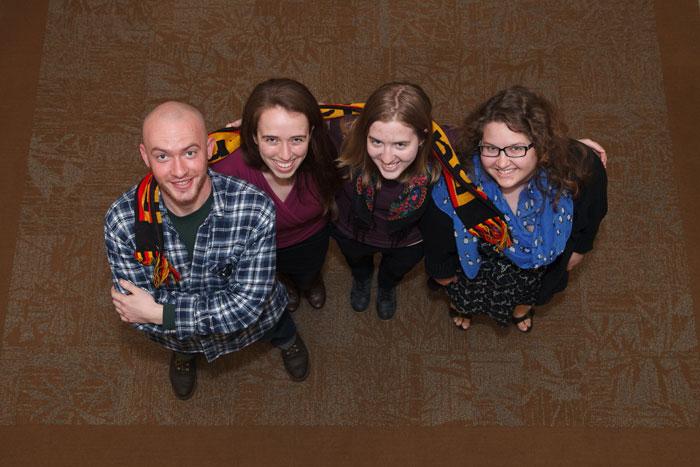'Fulbright Powerhouse'

From left, members of the class of 2015 Eric Neumeister, Anna Leistikow, Jane Feldmann and Olivia Wilkins are all off to Germany through recently awarded Fulbright grants. Photo by Carl Socolow '77.
Four more Dickinsonians head to Germany through the Fulbright program
by Tony Moore
Let’s just get right to it: Over the past six years, 11 Dickinson students have been awarded Fulbright awards to Germany, and it’s a pretty big deal.
“This is a major accomplishment for a liberal-arts college of our size,” says Jeremy Ball, associate professor of history and Fulbright advisor. “I, for one, am curious about what makes our German department such a Fulbright powerhouse.”
No easy answer (but a lot of big clues)
To begin answering that question, one just needs to take a look at the connections Dickinson students can make with Germany through an array of opportunities.
“Dickinson students and faculty have benefited from Germany’s financial support of scholars, teachers and academics in a number of ways,” says Associate Professor of German Sarah McGaughey, another Fulbright advisor, who notes ongoing student involvement with the German Academic Foreign Exchange service (DAAD) and the Max Planck Institutes. “These opportunities lead to students having deeper connections and understandings of the opportunities in Germany and with Fulbright.”
Students are quick to come up with answers of their own, and both Ball and McGaughey seem to be at the heart of the matter.
“Dickinson is incredible, in terms of the support they offer,” says Anna Leistikow ’15 (international studies, German), who earned an English teaching assistant (ETA) Fulbright this year after studying in the Dickinson-in-Germany program during her junior year. “Professors Ball and McGaughey spend hours offering feedback to candidates—helping us understand what we actually want and how to explain our experiences, strengths and interests.”
McGaughey spreads a lot of the credit around, making it clear that administrators and faculty all over campus support the Fulbright program. But that wouldn’t matter if students weren’t ready, academically and linguistically.
“All of our successes in Germany have come to students with excellent academic records, both in the classroom and in other campus activities, and with extensive immersive experience in study abroad,” she says. “They can all speak about contemporary issues in Germany and identify ways in which these issues are tied to larger and older cultural discourses, both in Germany and in other connected global contexts.”
A sort of homecoming
Olivia Wilkins ’15 (mathematics, chemistry), who worked with the Cologne Database for Molecular Spectroscopy (CDMS) at the Harvard-Smithsonian Center for Astrophysics last summer, will revisit the astrochemistry research she did at Harvard, but the University of Cologne lab will offer her a distinctly German setting.
“Germany is celebrated for its robust scientific culture, so I look forward to living and working in one of the hubs of scientific discovery,” says Wilkins, the recipient of a Fulbright research grant. “And it will be out of this world to work on the other side of that database in Germany and come full circle with the astrochemistry research.”
Jane Feldmann ’15 (German, English) studied abroad in Bremen during her 2012-13 year, and she now looks forward to being surrounded again by German language and culture as a Fulbright ETA.
“I cannot wait to improve my German even more and to experience more of everyday life,” she says, noting that Ball, McGaughey and Wendy Moffat, professor of English, were there every step of the way during the application process. “This experience will also improve my knowledge of my own language, strange as that may sound, because the best way to really know grammar is to be able to explain it yourself.”
Environment of success
Whatever Fulbrighters tackle in Germany, Eric Neumeister ’15, who will head overseas as an ETA, says student Fulbright success has a lot to do with Dickinson's approach to the liberal arts and global studies.
“The background Dickinson provides goes a long way toward helping you make sense of a new job in a new place,” says the international-studies major. “When you're used to making connections between people and disciplines, an opportunity like this seems far less intimidating and has the potential to be much more rewarding.”
“The liberal-arts context allows us to support these excellent students,” McGaughey adds. “We are small at Dickinson, but we enjoy the support of a college and community that recognize the benefits of learning about languages and cultures around the globe and in depth.”
Fulbright information sessions are scheduled for April, and the next application process begins over the summer. Interested students should contact professors Ball, McGaughey or Associate Professor of Physics Lars English.
Learn more
- Dickinson's Fulbright Success
- Fulbright at Dickinson
- Department of German
- Fellowships at Dickinson
- Fulbright U.S. Student Program
- Latest News
Published April 9, 2015